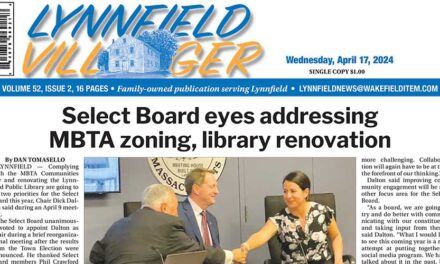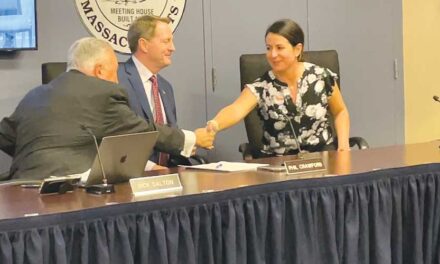Published in the April 26, 2017 edition
By DAN TOMASELLO
LYNNFIELD — The town is currently slated to receive $5,472,810 in local aid in the proposed House Ways and Means Committee budget for fiscal year 2018.
The committee recently released its proposed state budget for FY’18, totaling $40.3 billion. The spending plan is $180 million less than the budget filed by Governor Charlie Baker in January, but would still increase overall state expenditures by 3.8 percent.
Town Administrator Jim Boudreau said he’s pleased the town will receive slightly more in local aid for FY’18.
“We got $20,709 more from the House than the governor,” said Boudreau in a phone interview with the Villager. “It wasn’t a whole lot more for us, but I am happy the House and the governor are committed to the local aid accounts.”
State Representative Brad Jones (R-North Reading) expressed his support for the committee’s proposed budget for FY’18.
“The proposed $40.3 billion fiscal year 2018 budget reflects several of the spending and fiscal priorities put forward by the Baker-Polito administration,” said Jones in a statement. “I am pleased to see it builds on Governor Baker’s proposal to increase local aid to our cities and towns, while at the same time minimizing the use of one-time revenues to balance the budget and rejecting any broad-based tax increases.”
The proposed state budget would increase Unrestricted General Government (UGGA) Aid by $40 million, representing an increase of 3.9 percent. According to the Massachusetts Municipal Association (MMA), the increase in local aid would be the second largest increase in 10 years.
According to the Department of Revenue, Lynnfield would receive $1,038,979 in Unrestricted General Government Aid in FY’18.
The FY’18 state budget also seeks to increase Chapter 70 aid by $15 million more than Baker’s proposal, representing an increase of $106 million. It would lead to an increase of $30 per student.
According to the Department of Revenue, Lynnfield is scheduled to receive $4,272,061 in Chapter 70 aid, which is higher than Baker’s original budget allocation of $4,250,151.
The proposed spending bill would also increase the Special Education Circuit Breaker account by $4 million, equaling $281 million. The Circuit Breaker program partially reimburses school districts for the cost of individual students placed outside of their home school district.
While the Circuit Breaker increase is higher than Baker’s original proposal, the House Ways and Means Committee’s spending plan would not fully fund the program. The Circuit Breaker reimbursement formula provides for a 75 percent reimbursement rate for out of district special education costs.
According to the House Ways and Means Committee’s proposed FY’18 budget, the plan would level-fund payments-in-lieu-of-taxes at $26.77 million. The budget would also add $600,000 to library grant programs and would increase the METCO budget by $500,000. The budget would allocate $8.35 million for the McKinney-Vent Homeless Education Assistance Act.
The proposed budget would allocate $5 million for Shannon Anti-Gang Grants, equaling a $1 million reduction.
The House budget doesn’t include Baker’s proposed $2,000-per-worker charge on companies that have more than 10 employees but don’t offer health insurance benefits. Democratic Rep. Brian Dempsey, chairman of the Ways and Means Committee, said the plan instead instructs the administration to hold public hearings and get more input from the business community before imposing such a fee.
“There are a number of things we would like to see the administration take into consideration prior to implementing any assessment,” Dempsey said.
The House also lowered the revenue estimate from the proposed fee from $300 million sought by Baker to $180 million.
The governor had said he proposed the employer assessment to help counter a surge in costs for MassHealth, the state’s Medicaid program, which consumes more than 40 percent of all state spending. Officials have noted a sharp rise in people who have full-time jobs yet chose to go on Medicaid either because their employers don’t offer insurance or because the coverage offered is less generous than MassHealth.
After Baker’s proposal ran into stiff opposition from business groups, he had indicated in recent weeks that he was open to compromise.
The House budget also calls for the Baker administration to seek a waiver from the federal government that would prohibit workers who are offered health insurance through their employers from enrolling in MassHealth. Massachusetts had such a restriction in place before the Affordable Care Act superseded it.
“The House budget rightfully acknowledges the governor’s efforts to contain spiraling MassHealth costs,” said Jones.
A spokesman for Baker said the governor is concerned the House budget did not include his proposed changes to the state’s welfare program but looks forward to working with lawmakers to produce a final, balanced budget.
Despite a strong Massachusetts economy and low unemployment, the state’s fiscal outlook remains cloudy. Tax collections were running $220 million below official projections through the first nine months of the current fiscal year, revenue officials said.
Other key provisions of the committee’s budget plan includes:
• It calls for no broad-based tax increases but accepts the governor’s proposals to require more online retailers to collect sales taxes while modernizing overall sales tax collection procedures. The House budget wouldn’t apply the state’s hotel tax to online lodging services such as Airbnb, as the governor’s budget would, but Dempsey suggested lawmakers might take up that proposal in a separate bill.
• It says spending on community colleges and state universities would total more than $1 billion but would increase by only about 1 percent over current spending.
• The proposed budget creates a $2.5 million program to help identify learning disabilities in children before they enter elementary school
• The preliminary spending plan includes $4 million for implementation of the state’s legal recreational marijuana law, less than the $10 million sought by Democratic state Treasurer Deb Goldberg.
Jones also said he’s pleased the proposed spending plan makes “significant investments in critical areas such as early education and substance addiction, which continues to claim far too many lives in Massachusetts.”
The full House is scheduled to debate the budget plan this week.
“Over the next few days, the Republican Caucus will be taking a closer look at the budget to identify areas where we can offer amendments that will further assist our communities and safeguard the interests of the state’s taxpayers,” said Jones.
— The Associated Press contributed to this report.




